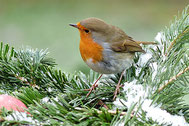Music to hear, why hear'st thou music sadly?
Sweets with sweets war not, joy delights in joy:
Why lov'st thou that which thou receiv'st not gladly,
Or else receiv'st with pleasure thine annoy?
If the true concord of well-tuned sounds,
By unions married, do offend thine ear,
They do but sweetly chide thee, who confounds
In singleness the parts that thou shouldst bear.
Mark how one string, sweet husband to another,
Strikes each in each by mutual ordering;
Resembling sire and child and happy mother,
Who, all in one, one pleasing note do sing:
Whose speechless song being many, seeming one,
Sings this to thee: 'Thou single wilt prove none.'
Music to hear (呼びかけて)O you, whose voice is music to hear
why hear'st thou = why do you listen to
sweets = things which are sweet, or delightful
war = to fight 争う、
thine annoy = your pain, displeasure 汝を苦しめるもの
true concord = perfect harmony 完全な調和
By unions married ポリフォニーのような重層ハーモニーによって
chide 叱る、confound = destroy 破壊する
In singleness = being single 独身でいること
parts (音楽における自分のパートとかけて)
Mark = pay attention、string (楽器リュートの弦をイメージして)
sweet husband to another (弦を弾くと隣の弦が共鳴するイメージ)
mutual ordering = in harmony
sire = father
Whose 前行の who の所有格、つまり一家 or リュートの複数の弦
speechless song 歌詞のないメロディー
being many (家族のメンバー or 弦が複数であることを受けて)
seeming one (調和した一つのハーモニーなので)
参考:The Sonnets (The New Cambridge Shakespeare) 他
ソネット8番の朗読です。Read by me.


コメントをお書きください